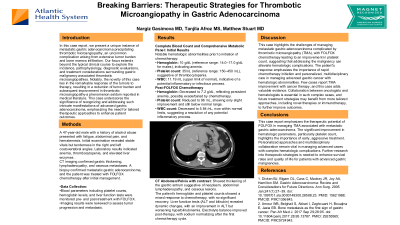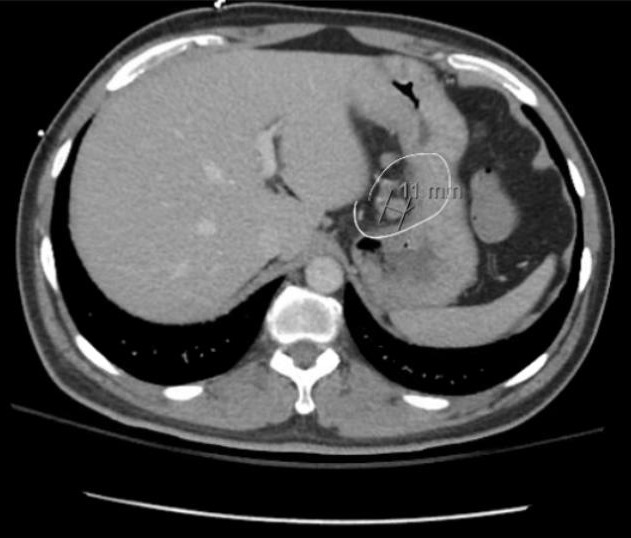Monday Poster Session
Category: Stomach
P3420 - Breaking Barriers: Therapeutic Strategies for Thrombotic Microangiopathy in Gastric Adenocarcinoma
Monday, October 28, 2024
10:30 AM - 4:00 PM ET
Location: Exhibit Hall E

Has Audio

Nargiz Gasimova, MD
Overlook Hospital
Summit, NJ
Presenting Author(s)
Nargiz Gasimova, MD, Tanjila Afroz,
Overlook Hospital, Summit, NJ
Introduction: In this case report, we present a unique instance of metastatic gastric adenocarcinoma precipitating thrombotic microangiopathy an uncommon complication arising from extensive tumor burden and bone marrow infiltration. Our focus extends beyond the typical clinical course to explore the incidence, pathophysiology, diagnostic evaluations, and treatment considerations surrounding gastric malignancy associated thrombotic microangiopathies. Notably, the novelty of this case lies in the remarkable response of the tumors to therapy, resulting in a reduction of tumor burden and subsequent improvement in thrombotic microangiopathy- a phenomenon seldom reported in medical literature. This case underscores the significance of recognizing and addressing such intricate manifestations of advanced gastric adenocarcinoma, emphasizing the need for tailored therapeutic approaches to enhance patient outcomes.
Case Description/Methods: The 47-year-old male patient presented with a history of alcohol abuse disorder and multiple symptoms, including abdominal pain, hematemesis, and syncope. Imaging revealed thickening of the gastric antrum suggestive of neoplasm, abdominal lymphadenopathy, and osseous lesions. Further investigations confirmed metastatic gastric adenocarcinoma with extensive metastases. Despite presenting with thrombotic microangiopathy, the patient exhibited a favorable response to FOLFOX therapy, evidenced by an increase in platelet count.
Discussion: Discussion encompasses the challenges in managing metastatic gastric adenocarcinoma complicated by thrombotic microangiopathy, highlighting the pivotal role of multidisciplinary care and ongoing supportive interventions. The case underscores the necessity of innovative therapeutic strategies and personalized treatment approaches to improve outcomes in advanced gastric cancer. Furthermore, the report emphasizes the need for ongoing research efforts to explore novel therapeutic avenues, including immunotherapy and targeted therapies. Advancements in diagnostic techniques and screening methods are crucial for early detection and predicting treatment response in metastatic gastric adenocarcinoma. By staying abreast of these developments, healthcare professionals can optimize patient management and improve outcomes for individuals facing this complex clinical scenario.
Keywords: metastatic gastric adenocarcinoma, thrombotic microangiopathy, FOLFOX chemotherapy, tailored therapy, treatment response

Note: The table for this abstract can be viewed in the ePoster Gallery section of the ACG 2024 ePoster Site or in The American Journal of Gastroenterology's abstract supplement issue, both of which will be available starting October 27, 2024.
Disclosures:
Nargiz Gasimova, MD, Tanjila Afroz, . P3420 - Breaking Barriers: Therapeutic Strategies for Thrombotic Microangiopathy in Gastric Adenocarcinoma, ACG 2024 Annual Scientific Meeting Abstracts. Philadelphia, PA: American College of Gastroenterology.
Overlook Hospital, Summit, NJ
Introduction: In this case report, we present a unique instance of metastatic gastric adenocarcinoma precipitating thrombotic microangiopathy an uncommon complication arising from extensive tumor burden and bone marrow infiltration. Our focus extends beyond the typical clinical course to explore the incidence, pathophysiology, diagnostic evaluations, and treatment considerations surrounding gastric malignancy associated thrombotic microangiopathies. Notably, the novelty of this case lies in the remarkable response of the tumors to therapy, resulting in a reduction of tumor burden and subsequent improvement in thrombotic microangiopathy- a phenomenon seldom reported in medical literature. This case underscores the significance of recognizing and addressing such intricate manifestations of advanced gastric adenocarcinoma, emphasizing the need for tailored therapeutic approaches to enhance patient outcomes.
Case Description/Methods: The 47-year-old male patient presented with a history of alcohol abuse disorder and multiple symptoms, including abdominal pain, hematemesis, and syncope. Imaging revealed thickening of the gastric antrum suggestive of neoplasm, abdominal lymphadenopathy, and osseous lesions. Further investigations confirmed metastatic gastric adenocarcinoma with extensive metastases. Despite presenting with thrombotic microangiopathy, the patient exhibited a favorable response to FOLFOX therapy, evidenced by an increase in platelet count.
Discussion: Discussion encompasses the challenges in managing metastatic gastric adenocarcinoma complicated by thrombotic microangiopathy, highlighting the pivotal role of multidisciplinary care and ongoing supportive interventions. The case underscores the necessity of innovative therapeutic strategies and personalized treatment approaches to improve outcomes in advanced gastric cancer. Furthermore, the report emphasizes the need for ongoing research efforts to explore novel therapeutic avenues, including immunotherapy and targeted therapies. Advancements in diagnostic techniques and screening methods are crucial for early detection and predicting treatment response in metastatic gastric adenocarcinoma. By staying abreast of these developments, healthcare professionals can optimize patient management and improve outcomes for individuals facing this complex clinical scenario.
Keywords: metastatic gastric adenocarcinoma, thrombotic microangiopathy, FOLFOX chemotherapy, tailored therapy, treatment response

Figure: CT Abdomen/Pelvis with contrast: Showed thickening of the gastric antrum suggestive of neoplasm, abdominal lymphadenopathy, and osseous lesions
Note: The table for this abstract can be viewed in the ePoster Gallery section of the ACG 2024 ePoster Site or in The American Journal of Gastroenterology's abstract supplement issue, both of which will be available starting October 27, 2024.
Disclosures:
Nargiz Gasimova indicated no relevant financial relationships.
Tanjila Afroz indicated no relevant financial relationships.
Nargiz Gasimova, MD, Tanjila Afroz, . P3420 - Breaking Barriers: Therapeutic Strategies for Thrombotic Microangiopathy in Gastric Adenocarcinoma, ACG 2024 Annual Scientific Meeting Abstracts. Philadelphia, PA: American College of Gastroenterology.
